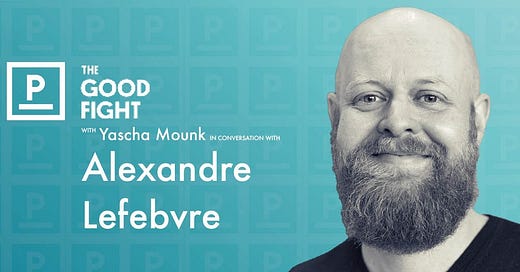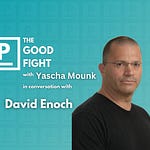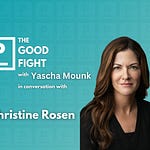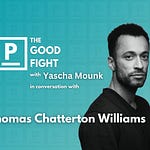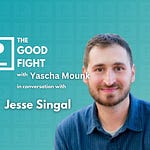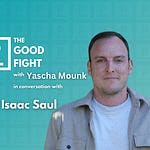Thanks for reading! The best way to make sure that you don’t miss any of these conversations is to subscribe to The Good Fight on your favorite podcast app.
If you are already a paying subscriber to this Substack or Persuasion, this will give you ad-free access to the full conversation with Alexandre Lefebvre, plus the exciting bonus episodes we have in the works! If you aren’t, you can set up the free, limited version of the feed—or, better still, support the podcast by becoming a subscriber today!
Alexandre Lefebvre is a professor of politics and philosophy at the University of Sydney. His books include Human Rights as a Way of Life and, most recently, Liberalism as a Way of Life.
In this week’s conversation, Yascha Mounk and Alexandre Lefebvre discuss the difference between political liberalism and liberalism as a comprehensive doctrine—or “way of life”; how we can uphold the core tenets of comprehensive liberalism—such as freedom, fairness, and reciprocity—in our daily lives; and the enduring relevance of the 20th century's foremost liberal philosopher, John Rawls.
The transcript and conversation have been condensed and lightly edited for clarity.
Yascha Mounk: Why don't we start with you making the case for liberalism in the refreshingly full-throated way that you do in the book? Why is it that you think we're in some ways too modest about the achievements of liberalism and in what terms should we celebrate it?
Alexandre Lefebvre: Our liberalism runs a lot deeper than perhaps we are prepared to admit. And I think that's especially true for people who identify as liberals. So people who are card-carrying liberals typically think about it as a political or institutional kind of thing, having to do with such things as rights, division of power, constitutions, and the like. And my pitch is that, in a sense, what the conservatives say about liberalism is quite correct, that it has become a much bigger, much messier beast than we might suspect. And so what I'm trying to suggest is that, for a lot of us, our liberal values may run very deep in the sense that they may be at the heart of who we are, informing how we navigate all kinds of different walks of life—friendship, romance, parenting, how we are in the workplace, extending to the kinds of words we use and don't use, the kind of stuff we laugh at. All that stuff might be a liberal package.
And so my book is a full-throated defense of liberalism. But it starts at a prior question, which is where do we find ourselves today? And especially for people who aren't religious, where is it that we're getting our big values, our big moral ideals from? And my gambit is that liberalism is the thing that a lot of us should be pointing to.
Mounk: Talk us through what that actually looks like—if you think that the values of people who aren't deeply religious are deeply influenced by liberalism and that that is really what sets our moral compass—when it comes to private interactions?
Lefebvre: It's no surprise to anyone, but the biggest growing group of religious affiliation today is non-affiliation. So, if you look at the category of people who tick the no religion box on the survey, they're growing more and more each year, faster than any denomination. And in the United States, it's a rather low number (still a gigantic population) of around 30%. You move to godless New Zealand and it's clocking almost at 60% now. Here in Australia, it's around 50%.
That's my audience. I'm trying to speak to people who don't have a prior religion that they can point to as the source for who they are. And the very first question that my book opens with is “Where do you, dear reader, get your values from?” And I think we live in a really weird moment in time right now where, if you have a religion, that question is a piece of cake. You point to your church, your doctrine. But you ask just anyone who's not religious that question, and they totally jam. They don't know what to answer. Their first impulse is often to go to something hyperlocal, like “I get my values and my sensibility from my parents or from my experience” or something like that. And that's perfectly fine. No doubt that shapes you, and that's crucial. Or else they point to something hyper-specific, like the novels of Marcel Proust or the films of Greta Gerwig or something like that. And again, cool, you're totally influenced by that thing. But of course we live in these broader frames of meaning and culture, and if we're not religious then I think that the one that we've probably absorbed and adopted is this liberal framework, precisely because (and we can talk about this) liberalism is the official hegemonic morality of our time. It's sort of what we are bombarded with 24/7. We just kind of grew up in those waters and that's who we are now. And so what I'm trying to do is to get liberals to recognize how deep it runs. And also to recognize what we stand to lose if this liberal moral paradigm is displaced, because I think it's more significant than a bunch of laws and protections, however significant those are. I think that we lose something deeply existential.
Mounk: I'm trying to skirt around what I think is going to be our main disagreement because I really wanted to lay out a little bit more of what I think we agree on. And just to give a gloss on this, I thought there was a kind of strange moral panic when Jordan Peterson first became really popular eight or ten years ago. And I always thought that his popularity is our fault; that if you were a young man who was a little bit lost, a little bit unsure of what to do in life (and that was certainly initially the main demographic that made him so popular and so successful), there just wasn't a lot of advice from good center-left (or, if you want, good center-right) people to say, here is how you can lead your life, here are virtues, here is what is meaningful. And so he stepped into that vacuum. And I have my criticisms of him and I particularly have my criticisms of how he's developed in the last few years, but it always struck me that rather than blaming him for that, we should have been blaming ourselves for giving away all of that space, precisely for reasons that I think you outlined. We're not willing to say, “Here is a coherent set of liberal ideas about how to actually live your life.”
I think we've sort of been on a slightly meta level, so far. What are these values that you think are hegemonic and that you think actually influence how we live in a way that perhaps goes deeper than the most obvious cultural products that it produces. What is that deeper tradition?
Lefebvre: Let me start with the Jordan Peterson thing. I think you're absolutely correct. I mean, I don't know if there's a God-sized hole in our heart, but I do know there's a Christianity-sized hole in our culture. And Jordan Peterson was at the right time at the right place with the right demographic and advice to fill that. There's all kinds of casting about for meaning. And I'm an academic, I'm a philosopher, and in my neck of the woods everyone and their mother is writing a book about wisdom from whatever tradition they are doing. So you have books coming out every day on how to live well according to the Scottish Enlightenment, Chinese philosophy, whatever. Everyone's trying to go somewhere else to try to find meaning and pull it into our world. And what I'm trying to do in the book is suggest that maybe the answer is already in the room. Maybe we already have a robust philosophy and we've already absorbed it and we just need to double down on the thing that we already have.
You asked me about its top-line values. In my book, I nominate three that I think are really at the center of this thing. One is a commitment to personal freedom—to my freedom, to your freedom. Another is a commitment to fairness. And the third is a commitment to reciprocity in the sense that I matter no more than you and you matter no more than me. And you take those three things together—freedom, fairness, and reciprocity—and you put them in a constellation, and I think you have something like liberalism. So those are typically seen as political values. But again, what I'm trying to say is that they've descended into the background culture.
The best example is the history of swear words. That might sound a little odd or unusual, but there's this great book written ten years ago by an author named Melissa Mohr and it has this fantastic title. It's called Holy Shit: A Brief History of Swearing. And in those two words, “holy” and “shit,” what she does is effectively summarize the history of swear words over a 3,000-year tradition in the West, and her point is that at different moments and times, under different moral and religious paradigms, you have different kinds of swear words. And very quickly, by finding out what a society thinks is bad and taboo and can't be said, you very quickly reverse engineer what its main moral commitments are.
In religious culture, if you swear on the name of Christ or God, that's serious business. And at other times, when religion is less sacramental or less important, shit words come to the fore—obscenities, things about sex. So the Roman civilization was all about that. Their big swear words were around sexual passivity. And if you called someone a queer, that's to impugn someone for not being a manly, virile citizen, and those were fighting words. Then you get into the Victorian era, and it turns to all kinds of excremental and sex words, etc. Now, you and I might love swear words. But we love the swear words that are safe to say and we can say the “holy” and “shit” kind of words all we like on this podcast and no one's gonna bat an eye. But there's a different kind of word today that if we were to say that would get your podcast in hot water and me fired within a week, which are of course slurs, right? Those are the truly unsayable words that we have today. And the reason why swear slurs are the big no-no word today is because they impugn the self-respect and the dignity of all people. We've so absorbed certain liberal commitments that our liberalism runs right deep down to our bones in the kinds of words that we reflexively do and don't use.
Mounk: You're right, of course. There's a very interesting point that a historian once made, which is that you're tempted to look at a book of manners as a straightforward guide to what people don't do in that society—but of course, a book of manners in many ways is a guide to what people do do in that society. So if you look at certain late medieval or early modern books of manners, people will say “You really shouldn't be burping or loudly farting at the table.” And of course that suggests that a lot of people thought that that was an appropriate thing to do and there was an ascendant social class that was saying “No, that's what we did in the past. That's no longer what we do.”
Möchten Sie meine Artikeln und Gespräche auf Deutsch direkt in Ihre Mailbox bekommen? Klicken Sie diesen Link und schalten Sie unter Notifications “auf deutsch” an! 🇩🇪
Where I am recording this right now in Tuscany, the go-to swear words are often very anti-clerical (Like “Dio cane,” or “God is a dog”). And it's of course because Catholicism continues to be an important value in Italy. It's shocking not because people don't care about Christianity, but because Christianity continues to play an important role.
Talk us a little bit through what those three values mean and why it is that they're specifically liberal.
Lefebvre: So a book that has really inspired me in this is Helena Rosenblatt's work, The Lost History of Liberalism. It's just terrific because it goes into the history of the word “liberal” and tries to see what it means right from the start. So liberalism is a weird thing. It's kind of the new kid on the block. It's 200 years old, which is like a newborn by the standards of intellectual history. But on the other hand, it is really old because the roots of the word go right back to Roman times. And the word liber means a couple of things; on the one hand, freedom and the quality of being free and being a freeborn person, but also the quality or the characteristic of being generous and a generous person. And it's those two qualities that are at the heart of what liberalism means in this tradition. Now, we tend to quickly associate liberalism with liberty and (critics would say) with individualism, egoism, selfishness, all that kind of stuff. But it's pointing to the freedom half of that equation, and we tend to forget the generosity half. When liberalism is born in the 19th century, though, those two ideas of being free and generous are really robustly connected. And the big question that I think animates almost all 19th century liberals, whatever their fascinating disagreements, whether we're talking the Frenchies like Tocqueville, Constant or Madame De Stael, or we're talking about the British tradition, all of them are asking, basically, looking at the modern world, how is it that human beings could remain on the one hand free, and on the other hand, generous, given all of these new pressures and temptations that the modern world is throwing at us. They were worried about capitalism and how it not just threatens inequality, but it threatens to turn us into nasty little consumerists who care only about our material satisfactions and pleasures; they were worried about nationalism and the closing of the mind in that sense; and they were especially freaked out by democracy. Today we think that liberalism and democracy are like peaches and cream. But the reconciliation between liberalism and democracy took 200 years to achieve, and hard-fought negotiation and compromise on the part of each of those bits. Because, initially, liberalism was established in order to counteract all of the perceived dangers of democracy.
Mounk: And just to briefly double-down on that point, there remains an essential tension between them. I argue this in The People vs. Democracy. If you think of democracy as something like translating the preferences of the people into public policy, and you think of liberalism as something, among other things, as constraints on what the state can do to individual citizens, those two things can come to be in tension when majorities of people persistently want laws and legislation and rules that constrain what individuals can do.
And at the same time, conversely, it's very hard, I think, in the long run to maintain either element without the other. So once you start having a political system that is deeply illiberal, it's very easy for the government to stay in power because it controls the media, because it has control over the judiciary and so on. And conversely, if you have a sort of technocratic elite that guarantees certain kinds of freedoms—as was the case under military domination in Turkey until relatively recently, as is the case in Singapore in certain ways—in order to sustain themselves, they're also going to limit the freedom of people, at the very least to criticize the government and probably to do other things as well. So the relationship between liberalism and democracy is very complicated because I think that they do effectively stand in tension. But once you give up on one of them, the other becomes really vulnerable.
Lefebvre: You push too hard and you not only lose the balance, but you lose the concept that you're trying to preserve.
Where we find ourselves today is that we've inherited a liberal tradition that in so many respects privileges freedom over all other qualities. And what I want to try to do is to insist again on the essential connection between the notion of freedom and of generosity. And the thinker that does this for me most powerfully is John Rawls, who was the great 20th century political philosopher—he worked at Harvard all of his career and he wrote his magnum opus, A Theory of Justice, published in 1971. And that book puts the idea of fairness right at the heart of a liberal. And I draw on Rawls so much because he's not just a great political theorist, I think he's a superb moralist in the sense that he's able to see what our moral commitments are. He looks around his contemporary United States and he looks at all of its major public documents, all of its major public institutions, constitutions, the judicial speeches, those kinds of things, and he's trying to identify what at the end of the day is the fundamental moral commitment of all of this. And he digs and digs and he finds this one concept, which he names fairness. And he says that—and this is the fundamental proposition of Rawls—that society should be a fair system of cooperation from one generation to the next. Rawls invents a million and one technical concepts to flesh this out, but he's always just trying to see what this idea of fairness demands of our societies and of ourselves. And in the book, what I tried to do is flesh out a little bit more what it demands of ourselves, especially once these ideas have ceased to be just kind of political stuff, but have gone into a much broader cultural frame.
A lot of liberals are scrambling right now. There's all these new challenges to liberalism and we're having to try to reinvent the doctrine. So we're reaching into the past to try to find inspiration—not to impose old visions but to see what resources the tradition has. And what I'm trying to do in my book is insist on a certain vision of generous and free living and how it can be revived for us today, especially for those of us who basically can profess no other values because we've been born in this liberal world.
Mounk: So one of the key debates among communists and socialists in the second half of the 20th century was a battle between the young Marx and the late Marx; after the rediscovery of some of Marx's earlier writings, student revolutionaries used the young Marx not just against bourgeois liberals but also against their own more orthodox late Marxist teachers. In a similar way, I fear that the rest of this conversation is going to be a battle between the young Rawls and the old Rawls—John Rawls has a key shift in his thinking.
We don't need to go into the details of this. But the way that I understand Rawls' mature philosophy, he says broadly something like the following (and some of this is in the young Rawls): When you're reflecting on how to build a just society, what you call the fair scheme of social cooperation, one of the fundamental things you realize is that people have very different notions of what makes a good life. And this is particularly true in ethnically and religiously diverse societies, but it's also true in seemingly more homogeneous societies. And so there's a fundamental question about the legitimacy of state power—a fundamental question about how it is that the police and the laws and the president and the prime minister can have any kind of power over what I should do. And Rawls' answer to this is to say, “Look, when it comes to how our politics is structured, we need to have a political liberalism, which is to say we need to have a set of rules and procedures through which we can gain assent among people with very different kinds of moral and religious views. We can have an overlapping consensus where even if I am a devout Catholic, I say, ‘You know what? I can live meaningfully in that society.’ And the fundamental part of that is the freedoms that we give to everybody.” Even if the majority of the population really dislikes your religious congregation, you have a right to congregate with each other and to be true to your religion. And so you can have a thriving Amish community in the United States whose moral values and whose vision of life is radically different from that of the median American. But they're able to do that because of political liberalism, because of the space that we give them. Now, to me, this really comes from the historical origins of liberalism, which lie in good part in the religious wars of these pretty homogeneous societies in early modern Europe which had decades and centuries of warfare until these societies were able to adopt something like a political conception of liberalism, which allowed them to live next to each other peacefully.
I think where I find your work incredibly valuable is on the insistence that one of the kinds of comprehensive doctrines that can and should flourish in that society is a liberal one. And we should be much more full-throated about articulating that as one of the kinds of moral visions that is available to people in this society. We shouldn't be worried about that. We need many more people (this was my point about Jordan Peterson) who provide alternatives to these other comprehensive doctrines by actually saying, “You are a slightly lost 20-year old trying to figure out what to do in your life. Let's not just have Buddhism as a way of life and Catholicism as a way of life and Jordan Petersonism as a way of life—let's have liberalism as a way of life. Let's tell you what from a liberal perspective you might think is valuable in your life.” But for me, it's very, very important that we distinguish between the political notion of liberalism that has to remain neutral between these different substantive visions of life and the comprehensive liberalism, which is one candidate among others within society that should compete for people's affection and endorsement but in terms that are equal.
I think the reason why that's so important is that we need to take the challenge from post-liberals seriously, which is to say the people who are saying, look, this political system claims to be neutral, it claims to allow for everybody to live as they want, but in fact, it doesn't leave the space for religious people to have a meaningful life, in fact, it doesn't allow people who don't get on board with the comprehensive doctrine of liberalism to have the same opportunities to develop their form of life. And I think that though their dreams of domination are chimerical—the idea, for example, that the United States is going to be ruled by some form of Catholic integralism defies any understanding of the empirical facts of the United States of America today—we are also chimerical if we think that we are going to be living in a peaceful, liberal, democratic society unless we make really sure that people whose comprehensive doctrines are not liberal do actually pertain to this overlapping consensus, do actually feel that they have a genuine place in this society to live as they wish.
And on that, I think there's some mistakes that we make. There are some particular laws and some particular social customs that I think do in fact marginalize them in ways that we should be self-critical about. But like you, I think we can actually be very proud of our record. Look at the flourishing Amish community in the United States, and what a testament that is to liberal tolerance. I think that is the best argument against the post-liberals. But if we start to say, “Hey, they're kind of right. Liberalism is a comprehensive doctrine and it does affect everything we do,” that to me seems to open the door very wide to their arguments winning the day.
Lefebvre: This might be too liberal an answer, but I think the young Marx, the old Marx, the young Rawls, the old Rawls, they can get along here. So let me pitch it this way. I am a political liberal in exactly the way you describe. I do definitely think I'm not a perfectionist liberal, by which I mean that I do not think that the liberal state should promote a certain way of life. All political liberals make one assumption, which is that everyone living in a liberal democratic society is, let's say, liberal plus something else. So they believe in liberalism, they uphold the Constitution, all that stuff, equal rights. but they are also something else: they're Christian, Muslim, Jewish. But there's always a composite identity between liberalism and some other form of identity. And they don't entertain the notion that someone's liberalism can run all the way down into them. And that's what my beef or my complaint with political liberalism is—it obscures what I think is the major morality of our time because a whole bunch of people aren't liberal plus something, they're just liberal all the way down. And I'm not saying the state should force that one. What I'm saying is that we need to recognize empirical reality for what it is.
Souhaitez-vous - ou quelqu'un que vous connaissez - avoir accès à tous ces articles et conversations en français ? Cliquez sur ce lien et activez “en français” sous Notifications ! 🇫🇷
Mounk: I think many of the listeners to this podcast probably do think of themselves as liberal. So what would it mean for us as a society and what would it mean for me, for you, for all of our listeners to be more genuine, more authentic, more real liberals rather than ones that simply pay lip service to these moral ideals?
Lefebvre: One main thing is whether a lot of your day-to-day behaviors support fairness in some really simple way. We live, of course, in compromised societies with deep inequalities, but there are certain things that we do here and now that are definitely illiberal.
I'll confess my great sin: I send my daughter to a private school here in Australia. Now, if I think about that for a moment, I don't think I can square that with my liberal commitments. I'm taking her talents, I'm taking some revenue out of the public system, and then putting it into this other thing which will lavish generational advantage on it, generating all this meritocracy business that we know and hate and love and participate in. And I think all of us do game the systems in that way. We file for taxes, we try to claim any deduction we can, we treat others ungenerously, we always try to assert our privileges and prerogatives above those of others. They just insinuate themselves into our everyday behavior. So what I'm trying to say is that we have to call ourselves out for not living up to it.
Now, the book isn't scolding. I'm not trying to say that you're a bad liberal. That's not at all the point. What I'm trying to do in the book is I'm trying to furnish readers with reasons as to why they might want to adhere to their liberal values. And so I outline all the kinds of pleasures and joys and what I call felicities (or perks) of living a liberal way of life. I think there are a great many. I think it's joyful, it's cheerful, it's redemptive in some important way. It leads to all kinds of wonderful ideas like being more impartial, more autonomous, more free. So that's the pitch that I'm trying to make.
In the rest of this conversation, Alexandre and Yascha further discuss the life and work of John Rawls. This introduction to Rawls’ thought is reserved for paying members...
Listen to this episode with a 7-day free trial
Subscribe to Yascha Mounk to listen to this post and get 7 days of free access to the full post archives.


